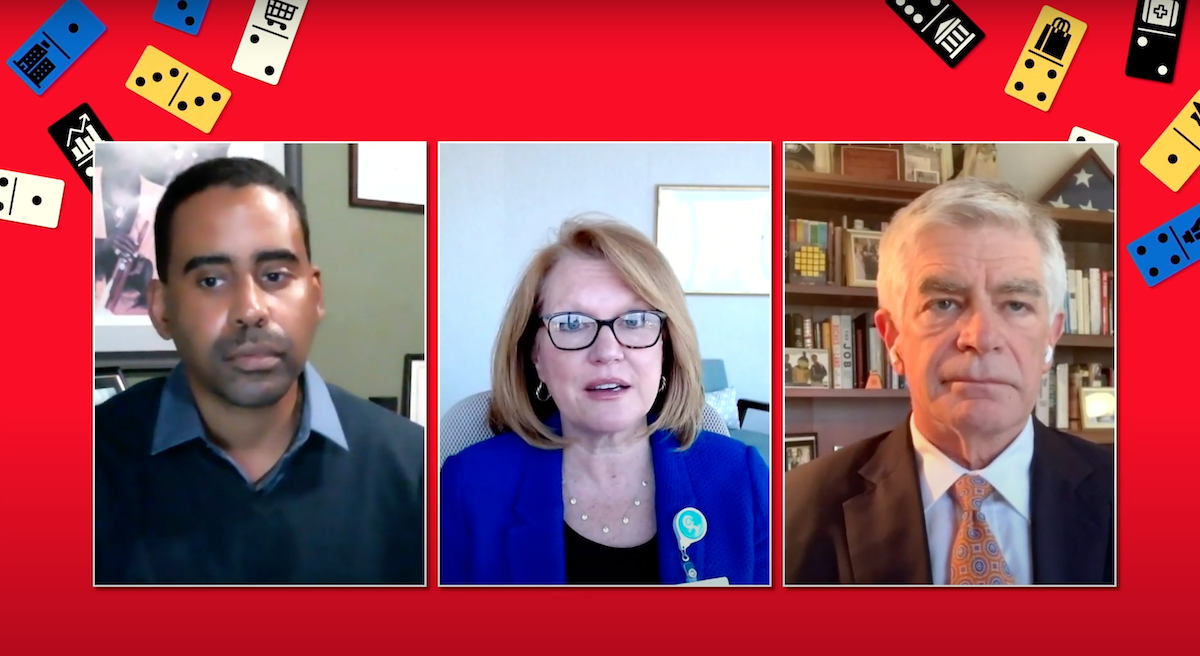What a difference 12 months makes.
For the past several years, members of the Chamber of Commerce for Greater Philadelphia have convened in January at its annual Economic Outlook event to talk about what the city and its businesses’ near future will look like.
Last year, the Chamber released survey results among members showing that respondents felt slightly less optimistic about business conditions in 2020 than they did in 2019, and economist Lara Rhame shared why she felt a recession wouldn’t hit the Philly region as hard as other major U.S. cities.
But in January 2020, few could predict the economic shock that the coronavirus pandemic would have on the region. So as Chamber members gathered for the annual event last week, focus was predictably on what 2021 would look like as the country and region, hopefully, begin to recover from the pandemic.
Much of Philadelphia’s recovery boils down to what we’re seeing around the world. Patrick Harker, president of the Federal Reserve Bank of Philadelphia, said it plainly:
“The most important thing we can do … is get the vaccine in your arm. It wont make any difference to our economy if it sits in a vial,” Harker told CHOP President and CEO Madeline Bell during the event. “That’s really what’s driving the economy right now. You know, realtors say, ‘location, location, location.’ In this case, it’s ‘the virus, the virus, the virus.'”
(Here’s a look at Philly’s plan to distribute the COVID-19 vaccines.)
The virus must be under control for the economy to rebound, even if the government lifts their stay-at-home orders for restaurants or other businesses, he added — “because if people don’t feel safe, they’re not going to take their family there.”
In this period where businesses are worried about the fiscal cliff and folks are worried about losing their homes or feeding their families, the Fed will keep monetary policy accommodating throughout the entirety of the pandemic, Harker said. It’s needed to make sure the groundwork is there for the economy to recover.
Both Harker and Joseph Davis, global chief economist and head of investment strategy group for Vanguard, agreed that if the country moves forward with more stimulus or economic relief, it should be more targeted toward businesses and individuals who really need it, whether it be in Paycheck Protection Program loans, unemployment assistance or stimulus checks.
Davis spoke with Chamber President Rob Wonderling about inflation, forced pivoting and innovation and a growing economy in Q3 or Q4 of this year.
How quickly recovery begins will come with the pace of vaccine distribution, he pointed out. A likely timeline could include an acceleration of the economy and spending when hospitalizations and deaths decline and society reaches heard immunity, likely in summer or fall of this year.
Tech has also accelerated because of the pandemic, whether forced or as an experiment to bend to the future of work, one “silver lining,” Wonderling said.
We’ll likely see three trends in the years ahead, Davis said: Some behaviors have accelerated because of the pandemic, like remote work. Some business types have pivoted and may remain in their new forms, or a hybrid version, like the events industry. And some old behaviors will return.
For instance, while some experts have mused that socializing, restaurants or travel may never return, he doesn’t believe that’s true. Energy technology, food and healthcare saw high digital transformation during the last year, and will likely embrace those changes moving forward. And the quickly developed vaccine is another sign toward another year of healthcare innovation, Davis said.
Bell agreed, saying that it’s hopeful to have two approved-for-emergency-use vaccines and another two in late-stage trials. She is, however, worried about vaccine hesitancy, even within her own network, in which about 65% of workers are accepting the vaccine. But the messenger RnA technology in the current COVID-19 vaccines can be applied to other vaccines, future mutations or viruses.
“If you want to be cautiously optimistic on the global economy going forward, I think you do have to point to innovation, which has always been the lifeblood and underpinning of genuine growth over and above policy,” Davis said.
Check out the Chamber’s member survey on 2021 business conditions, and watch a recording of the Economic Outlook event below.







